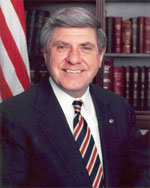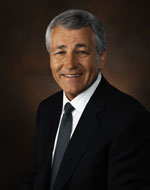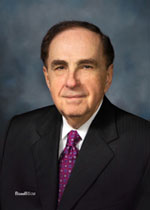 |
U.S. Sen. Ben Nelson |
 |
U.S. Sen. Chuck Hagel |
 |
Harold M. Maurer, M.D. |
This bill — which is part of the 2008 fiscal year budget — still must be approved by Congress and the president.
Nelson secured $900,000 toward construction of one floor for cancer research in the Research Center of Excellence II (RCE II) building, currently under construction. Hagel and Nelson were responsible for appropriations of $100,000 for the UNMC Eppley Cancer Center’s Nebraska Early Detection-Informatics Technology Project (NEED-IT) and $200,000 to support construction in a planned 40,000-square-foot, state-of-the-art teaching environment for the College of Nursing’s Lincoln Division.
“UNMC is a top-notch research facility and a cornerstone of our state’s health care system,” said Nelson, a member of the Senate Appropriations Committee. “I am proud to help advance the life-saving work that is done at UNMC by obtaining this funding. I was particularly glad to secure $900,000 towards construction of a floor in the Research Center of Excellence II facility, which will be dedicated for researchers from the Eppley Cancer Center — the only National Cancer Institute-designated cancer center in a five- state region from North Dakota to Texas and one of only 61 nationally.”
Securing adequate funding for UNMC is vital to supporting the overall health care scenario for the state, Hagel said.
“It is critical for the University of Nebraska Medical Center to continue being a premier medical research institution in order to educate quality health care professionals and to serve the medical needs of Nebraska,” Hagel said
Harold M. Maurer, M.D., UNMC chancellor, said he and the UNMC community are grateful for the support from the state’s two U.S. Senators.
“We are very appreciative of the work they’ve done not only on UNMC’s behalf, but also on the improvements in health this will ultimately mean for Nebraskans and others,” Dr. Maurer said. “The support helps us continue building momentum of becoming a world-class academic medical center.”
The support UNMC receives from Sens. Nelson and Hagel is critical to the growth of the medical center’s research effort, said Tom Rosenquist, Ph.D., UNMC vice chancellor for research.
“Our research in turn helps guarantee that the people of Nebraska will continue to have access to state-of-the-art health care as we accelerate into 21st-century medicine,” Dr. Rosenquist said. “I cannot fully express how much we appreciate the senators and their great staffs.”
Virginia Tilden, D.N.Sc., dean of the UNMC College of Nursing, said the funds from the appropriation would help support the construction of one floor of the future nursing education building in Lincoln.
“We commend the senators for their support in our efforts to advance our mission of preparing the best-educated health professionals and scientists,” Dr. Tilden said. “The support will help us provide students with state-of-the art educational tools — such as computer imaging — that will help us create such virtual scenarios as simulated intensive care units and telehealth labs. These resources will help us lessen the burden of the nursing shortage.”
Support also has been appropriated for NEED-IT, a program based on a national model designed to improve the early detection and management of lung cancer and other smoking-related diseases.
The NEED-IT study will implement and refine lung cancer screening through computerized tomography (CT) screening and biomedical informatics, to ultimately improve clinical decision-making for lung cancer and chronic obstructive pulmonary disease.
As the first state-wide uniform lung cancer screening program in the nation, NEED-IT will be a model program for the nation, Dr. Cowan said.
“Building new programs in cancer causes, control and prevention will enable the UNMC Eppley Cancer Center to achieve our goal of a National Cancer Institute-designated Comprehensive Cancer Center, a designation and ranking among the elite cancer centers in the United States,” said Kenneth Cowan, M.D., Ph.D., director of the UNMC Eppley Cancer Center. “This recognition means the most current and innovative treatment options will be available to patients through the integration of cutting-edge research and state-of-the-art care.”